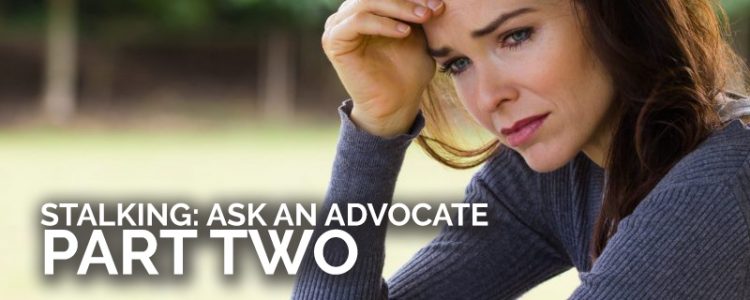Since January is National Stalking Awareness Month, we partnered with a local anti-stalking advocate (part of the Columbus Domestic Violence/Stalking Unit) to get answers to commonly asked questions. Take a look below to learn more about stalking, law enforcement and evidence collection. The following is a continuation of Stalking: Ask An Advocate, Part One.
Q: Can you explain a stalking trial?
A: Whereas most other crimes involve one incident, stalking involves a pattern with likely multiple incidents over a span of time. Each one of the incidents may have to be thoroughly addressed in the trail. Patience and understanding is key, as judges and jurors process all of the information in different ways. Evidence can be a large variety of things – as simple as a rubber band, cupcake box or a used cigarette. Other evidence might include text messages of the victim’s safety concerns to a family member, or the victim’s boss explaining the changes that have been made in the workplace for the victim’s safety. The main message is to save everything, because you never know what might be important.
Q: What is a common myth that you’d like to debunk?
A: A common myth is that you can reason with a stalker. Most stalkers are not logical thinkers. Stalking is not about a misunderstanding or someone with good intentions; stalking is about control, like many other forms of abuse. We suggest being as clear as possible with an individual that you no longer wish to communicate with. After that, no other explanation is owed. We suggest documenting that request to stop communication, what led to the request, and all other communication incidents from there. While it may, in certain circumstances, be necessary for a victim to communicate with a stalker for safety reasons, it is usually best to cease all communication as soon as possible so it is clear that the activity is one-way.
Q: Do you know of other organizations, locally or nationally, that offer training on stalking or lethality?
A: The Ohio Attorney General puts on trainings about stalking twice a year, and the Stalking Resource Center also conducts trainings several times a year. The DV/Stalking Unit helps with the Ohio Attorney General’s Office when we can.
Q: What do you wish people were more aware of?
A: One thing we wish more people were aware of is that stalking is serious. Because most incidents related to stalking do not involve crimes (leaving flowers at the door, a phone call), most people do not see the harm and believe the victim may be overreacting. For those of us in the field, we see how these seemingly innocent patterns are not innocent, and how quickly they can escalate to something far more severe. Additionally, most do not consider stalking an offense of violence. While the acts may not involve violence directly, they can certainly lead to violence, carry a high level of coercion and control, and have some of the most lasting effects on victims because the victim was a prisoner of his/her own world. Stalking should be taken seriously at any level and stalkers should not be underestimated because they are often unpredictable.
Q: How is law enforcement involved in stalking?
A: Stalking involves a pattern of conduct and the mental distress caused by this pattern. The pattern could look different for everyone. When an officer responds to take a report, they may not see the pattern at the time, but rather a small glimpse of the situation. It is important to share all information with an officer, explain any patterns or “coincidences” that might have occurred, and any prior police reports or threats. There is no specific number of reports that generally do the trick, however the more forthcoming the reporting party is with information and evidence, the more likely officers have been to label the report as stalking. In our department, detectives view all stalking reports. It is very rare for an officer to arrest an individual for stalking unless they are aware of an ongoing situation and likely catch the offender in the act. Because stalking patterns can be drawn out and are not meant to be noticed, detectives or a prosecutor’s office are often the ones to charge stalking offenses.
In the meantime, a victim can always call our office (DV/Stalking Unit) or local shelters for information on protection orders, safety planning and how to document and preserve evidence. We often use the phrase, “pretend your stalking situation is a report you have to give in school.” You would want to make sure you have the evidence available to show an officer and be able to explain what is taking place. Some people find a notebook helpful to write everything down and note new events. Others create a binder of information with images of text messages and other communications. When it comes to preserving evidence, plans A, B, C and D are necessary. Screenshotting a text conversation may not be helpful if something happens to your phone, so save the image in a few places and print if possible (if safety permits). Another important note for iPhone users is to document all of the information of text messages. Sometimes it is challenging to tell if a text was received 2 days ago or 2 years ago.
Please help spread the word to your loved ones by sharing this article on social media, using hashtags #NSAM, #NSAM2018 and #EndStalking. Everyone deserves to feel safe.
National Resources
National Stalking Resource Center
Victimsofcrime.org
National Center for Victims of Crime
Helpline: 855-4-VICTIM (855-484-2846)
Online Chat: Chat.VictimConnect.org
Victim Connect hotlines and helpful links
Safe Horizon
24-hour Hotline: 1-800-621-HOPE (4673)
https://www.safehorizon.org/hotlines/

Leave a Response